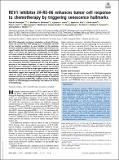REV1 inhibitor JH-RE-06 enhances tumor cell response to chemotherapy by triggering senescence hallmarks
Author(s)
Chatterjee, Nimrat; Whitman, Matthew A; Harris, Cynthia A; Min, Sophia M; Jonas, Oliver; Lien, Evan C; Luengo, Alba; Vander Heiden, Matthew G; Hong, Jiyong; Zhou, Pei; Hemann, Michael T; Walker, Graham C; ... Show more Show less
DownloadPublished version (921.8Kb)
Publisher Policy
Publisher Policy
Article is made available in accordance with the publisher's policy and may be subject to US copyright law. Please refer to the publisher's site for terms of use.
Terms of use
Metadata
Show full item recordAbstract
© 2020 National Academy of Sciences. All rights reserved. REV1/POLζ-dependent mutagenic translesion synthesis (TLS) promotes cell survival after DNA damage but is responsible for most of the resulting mutations. A novel inhibitor of this pathway, JH-RE-06, promotes cisplatin efficacy in cancer cells and mouse xenograft models, but the mechanism underlying this combinatorial effect is not known. We report that, unexpectedly, in two different mouse xenograft models and four human and mouse cell lines we examined in vitro cisplatin/JH-RE-06 treatment does not increase apoptosis. Rather, it increases hallmarks of senescence such as senescence-associated β-galactosidase, increased p21 expression, micronuclei formation, reduced Lamin B1, and increased expression of the immune regulators IL6 and IL8 followed by cell death. Moreover, although p-γ-H2AX foci formation was elevated and ATR expression was low in single agent cisplatin-treated cells, the opposite was true in cells treated with cisplatin/JH-RE-06. These observations suggest that targeting REV1 with JH-RE-06 profoundly affects the nature of the persistent genomic damage after cisplatin treatment and also the resulting physiological responses. These data highlight the potential of REV1/POLζ inhibitors to alter the biological response to DNA-damaging chemotherapy and enhance the efficacy of chemotherapy.
Date issued
2020Department
Massachusetts Institute of Technology. Department of Biology; Koch Institute for Integrative Cancer Research at MITJournal
Proceedings of the National Academy of Sciences of the United States of America
Publisher
Proceedings of the National Academy of Sciences